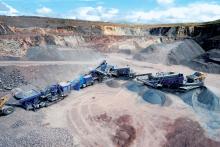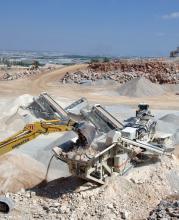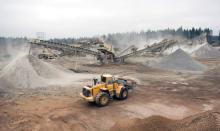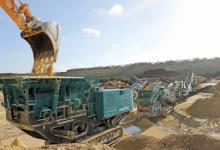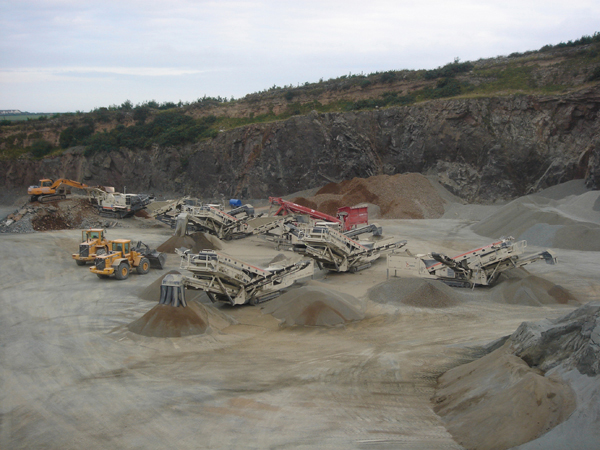
New crushing and screening equipment investment at the Isle of Man's historic Poortown Quarry has given the site a new lease of life
The Isle of Man is world famous for the motorbike TT races and attracts motorsport fans from far and wide who want to test the island's famous roads for themselves. Probably few consider where the materials to surface the island's roads came from but for the last 128 years much of the aggregates have been sourced from Poortown Quarry.
The government owned quarry, which opened in 1880, has just been given a new lease of life which will ensure the island has enough road aggregates for another 80 years. The quarry area has been extended and operation of the site modernised with a €10million investment in new crushing and screening equipment.
"The island isn't blessed with very many good deposits of igneous rock," said quarry manager Kevin Brookes, a former civil engineer who has been running the site for the Works Division of the Isle of Man Government's Department of Transport since 1994. "Poortown's granite stone is hard and durable."
As part of the upgrade at Poortown, the site's existing
Rock extracted at Poortown is crushed and screened into six sizes - 28mm, 20mm, 14mm, 6mm and fines. Brookes said the configuration of the screening decks of the ST352s can be altered according to the needs of the quarry at that time. "The 28mm stone is used in the roadbase on the island, where as the surface course is formed using 10mm, 6mm and fines and pavements use just 6mm aggregates," he said.
Tracked benefits
Previously Poortown used static jaw crushers to process rock blasted from the face but investment in the tracked Lokotrack units has helped reduce the quarry's hauling and loading needs. Now the quarry uses its
Smaller stones are fed directly from the LT105 into the LT200HP cone crusher and then passed via conveyor belt into one of the Lokotack mobile screens. The screen removes material over 20mm, which is then fed into a tertiary crushing phase that is carried out by the second LT200HP. From there
the material is fed into one of the new screens to separate the 10mm, 6mm and fines. The other screen is used when 28mm, 20mm and 14mm grades are needed. Once crushed, the aggregate is loaded into hoppers that feed into the site's asphalt plant.
"The Lokotrack crushers and screens are capable of producing 300tonnes an hour all day long," said Brookes. "The LT105 is a workhorse, and working with the LT200HPS provides the most efficient way of processing you can get. The Metso mobile screens are double-decked, so it's merely a question of juggling the screen mesh sizes to determine which product we want to make.
"As elsewhere in the industry, the real price of aggregate is falling at the same time as expectations of quality are rising. The market is increasingly coming to understand the economic impact improved aggregate shape can play in significantly reducing the total cost of concrete and asphalt, two of the main uses for aggregates." Cubicity is therefore essential. "If you can't make your stone cubical then no-one will want it because it will become flaky and breaks up faster under pressure than a non-cubical stone," explained Brookes. "The Metso cones are ideal for this. The LT200HP mobile crushing plant produces a very good practical shape which is exactly what we need." To operate cost-effectively, it is also important that the quarry produces the right product with the minimum possible waste. "If there are no orders in for 28mm roadbase we recycle the 28mm, 20mm and the 14mm we've already produced back through the tertiary, and produce the products our customers do want - which is often 10mm, 6mm and dust," said Brookes. "The LT200HPs allow us to do this very efficiently."
Nordberg became part of Metso Minerals in 2001 and its core technologies form the heart of the quarry's new Metso line of machines. "It was the reliability of our former Nordberg C110 which provided us with the incentive to replace it with our current LT105 in 2006," said Brookes. "Our old Nordberg machines had a reputation for being built to last. We've had other makes of crushers in here on hire, but they struggle. We're extracting a particularly hard igneous rock, which needs a well built machine."
Communication
Poortown's Lokotrack crushers feature Metso's intelligent control (IC) system technology monitors and controls the crushing process and allows the mobile crushers to communicate with each other. The quarry's Lokotrack mobile screens also use Metso's SmartScreen technology to control the material feed rate, screen box performance, start-up and shutdown.
"The whole train of equipment monitors itself so just one person is required to run it," said Brookes. "The ability of one unit to communicate with other units means that you don't need to have manpower on every machine watching what's happening. Surcharging (overloading) a screen can slow the whole process down, but the technology corrects this automatically by communicating with the primary to slow the feeder tray down." All the Lokotracks are also powered individually, so no electric cables trail over the quarry floors. "Being powered by their own diesel engines also removes us from the burden of having to factor in potentially huge electricity costs," added Brookes.
But the real beauty of having a fully mobilised plant is that if a machine requires maintenance you can work around it. "If we needed to work on our old static tertiary, everything stopped. You couldn't feed anything else other than the tertiary. Now, you can build a stockpile of material that the secondary produces. Or you can move the screens in close to the secondary which can then feed the screens. It doesn't have to feed the tertiary," said Brookes.
It's the same when plant breaks down. "When you had a fixed crushing plant with fixed conveyors, and element four went down in a chain of 10, all 10 stopped, because the process relied on all these elements working in sequence properly. Now if, say, our primary is out of action for a fortnight, you can hire in another machine on tracks." The mobile crushing plant has also improved health and safety at the quarry. The potential for accidents has been reduced on site as fewer dump trucks and manpower are required to move material from the quarry to the crusher.
Future proof
Although Poortown's current production is focused on the roads market, the equipment at the site is flexible enough to cope with changes in demand. "Just a few years ago everyone wanted 40mm chippings for railway ballast, incinerator sites, sewage treatment plant and where liners were laid out on stone chippings," said Brookes. "This year everyone wants 6mm."

